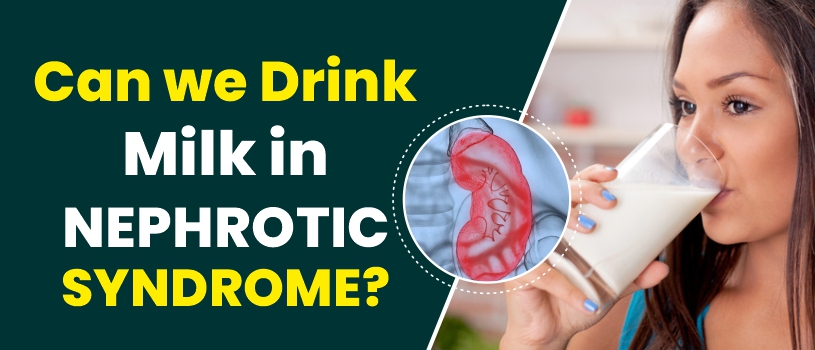Can We Drink Milk in Nephrotic Syndrome?
What is Nephrotic Syndrome?
Nephrotic syndrome is a kidney disease in which your body passes an extreme amount of protein in your urine. Generally, it is caused by injury to the group of small blood vessels present in your kidney that filters the blood and removes the excess waste.
This serious condition leads to swelling mainly in your ankle and feet, and it also upgrades the risk factor of other health problems. Basically, Nephrotic Syndrome is not a disease. It's a cluster of symptoms that comes into view if your kidneys are not working in the desired manner. It is a disorder that can have an impact on both children and adults, and the great point is that it can be cured.
Who is more likely to get this syndrome?
There are certain people at risk of getting this syndrome and those who have some specific disease such as amyloidosis, diabetes, and lupus.
Your risk of getting this syndrome gets doubled if you are on nonsteroidal anti-inflammatory drugs on a daily basis.
There are some other bacteria’s as well that can increase the possibility of getting Nephrotic Syndrome -
- Malaria
- Hepatitis B and C
- Untreated strep infection
- HIV
Symptoms of Nephrotic Disease
- Loss Of Appetite
- Weight Gain
- Fatigue
- Swelling
- Excess amount of protein in your urine
Diet Recommendations during Nephrotic Syndrome
Change in your diet is really essential to avoid kidney damage. Because of this syndrome, there is a loss of protein in your body. So, people start taking a rich high, protein diet in order to fulfill the deficiency of protein in their body. Instead, they should take a diet that has fewer proteins as excess protein is deadly, it can harm the nephrons and can lead to Renal Insufficiency.
It is also suggested to take a low sodium diet if you have nephrotic syndrome as it can lead to hypertension and swelling.
As this disease also leads to excessive fat, it is suggested to reduce the fat; it may stop cardiovascular disease.
Foods To Eat
As soon as you realize that you have some type of disease or disorder, the first thing that comes to your mind is can we eat our favorite dishes? So the answer we get is yes! Maybe sometimes we can eat them, but there are always some restrictions if you have some type of disease, so here let's see what is that you can eat in nephrotic syndrome and what you cannot eat.
- Whole Grains
- Low sodium vegetables (tomatoes, green beans)
- Frozen and fresh fruits (pear, apple, banana)
- Soybeans
- Dried beans
- Milk, Tofu, Cottage cheese, Butter
- Rice, Potato, etc.
Foods Not to Eat
Now let's talk about the restrictions on food if you are suffering from nephrotic disease. If you are a patient of this syndrome, then it is really important for you to take your diet instructions seriously; otherwise, it can lead to serious health-related issues.
- Pickled Vegetables
- High sodium meat and food
- Salted Snacks
- Processed cheese
Low sodium alternatives are vinegar, ketchup, spices, etc. You can take these into consideration.
Can we drink milk in Nephrotic Syndrome?
Different patients have different liquid requirements based on their medical history, conditions, and body type. Your doctor will inform you about how much liquid you can intake in a day. And he/she can also tell you about how you can cope with your thirst without disturbing your kidney-friendly diet.
ayurvedic treatment and medicine for nephrotic syndrome
As mentioned above, you can drink milk in nephrotic syndrome but in how much quantity you have to discuss with your dietician or doctor. It is important to manage your daily food intake so that you can avoid excess protein in your body. You can also use alternatives like almond milk rice milk which is less in potassium and phosphorus and, of course, protein than cow's milk.
Is It important to keep track of your liquid intake?
It's not that important to keep track, but you may feel more organized and better if you do keep track of how much liquid you drink. If you don't have a track and you intake an excessive amount of liquid, then it can lead to certain health problems like -
Frequent changes in your blood pressure -
- Excessive fluid in your lungs can cause breathing problems.
- Increasing weight and swelling in between dialysis sessions.
- It can lead to heart trouble.

Comments
Post a Comment